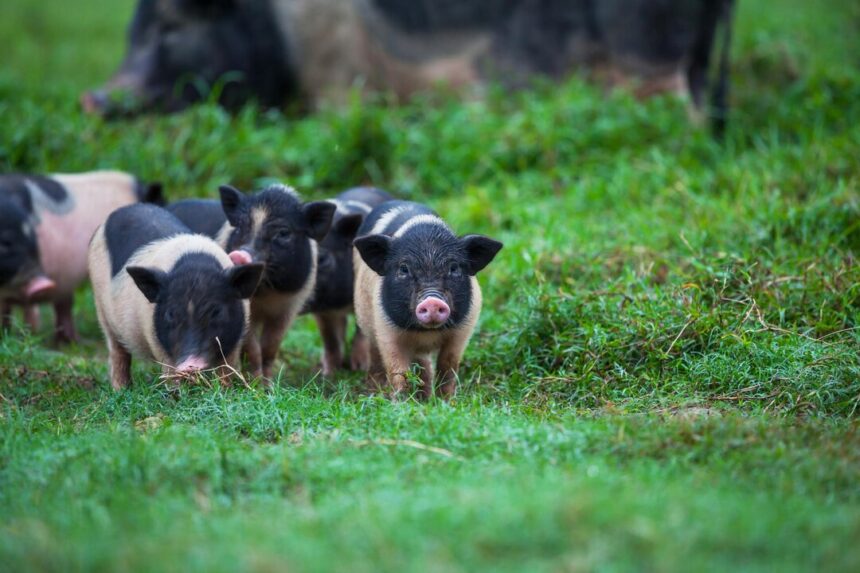Berkshire pigs, renowned for their exceptional meat quality and distinctive appearance, have gained popularity among farmers and consumers alike in South Africa. With their rich heritage and valuable traits, Berkshire pigs offer unique opportunities for breeding and farming in the country. In this article, we’ll delve into 10 essential aspects of breeding and farming Berkshire pigs in South Africa, shedding light on their history, characteristics, and significance in the agricultural landscape.
1. Historical Origins
Berkshire pigs trace their origins to Berkshire County in England, where they were first bred in the 17th century. Known for their black coat with white markings, Berkshire pigs were prized for their flavorful meat and superior marbling, making them a favorite among British farmers and royalty.
2. Adaptability to South African Climate
Berkshire pigs have proven adaptable to the climate and conditions of South Africa, thriving in various regions across the country. With their hardy constitution and ability to tolerate both heat and cold, Berkshire pigs are well-suited to the diverse agricultural landscapes of South Africa.
3. Meat Quality and Flavor
One of the key attractions of Berkshire pigs is their exceptional meat quality and flavor. Berkshire pork is renowned for its rich marbling, tenderness, and succulence, making it highly sought after by chefs and consumers for gourmet dishes and artisanal products.
4. Growth Rate and Feed Efficiency
Berkshire pigs exhibit favorable growth rates and feed efficiency, allowing farmers to optimize production and minimize input costs. With their efficient conversion of feed into muscle, Berkshire pigs can reach market weight in a relatively short time, making them an economically viable option for pig farming operations.
5. Reproductive Performance
Berkshire pigs are known for their excellent reproductive performance, with sows exhibiting strong maternal instincts and prolificacy. These traits contribute to consistent litter sizes and high survival rates, ensuring a steady supply of piglets for breeding and production.
6. Heritage Breed Conservation
In South Africa, Berkshire pigs play a vital role in heritage breed conservation efforts aimed at preserving traditional livestock breeds and genetic diversity. By supporting Berkshire pig breeding programs and promoting their value to farmers, enthusiasts, and consumers, these initiatives contribute to the conservation of agricultural heritage and biodiversity.
7. Grazing and Foraging Abilities
Berkshire pigs possess natural grazing and foraging abilities, making them well-suited to extensive and pasture-based farming systems. With access to pasture and forage, Berkshire pigs can supplement their diet with natural vegetation, reducing reliance on concentrated feed and promoting sustainable farming practices.
8. Health and Welfare Considerations
Proper health and welfare management are essential for maintaining the well-being of Berkshire pigs. This includes providing a clean and comfortable living environment, access to fresh water and nutritious feed, and routine veterinary care to prevent disease and ensure optimal health throughout the production cycle.
9. Market Demand and Premium Pricing
Berkshire pork commands premium prices in the market due to its superior quality, flavor, and provenance. Chefs, restaurateurs, and discerning consumers are willing to pay a premium for Berkshire pork products, creating lucrative opportunities for farmers and producers who prioritize quality and sustainability in their operations.
10. Sustainable Agriculture Practices
Berkshire pig farming can contribute to sustainable agriculture practices by promoting biodiversity, soil health, and ecosystem resilience. Through pasture-based systems, rotational grazing, and holistic management approaches, farmers can harness the natural behaviors and characteristics of Berkshire pigs to enhance environmental stewardship and farm sustainability.
Breeding and farming Berkshire pigs in South Africa offer a unique opportunity to engage in heritage breed conservation, promote premium pork products, and contribute to sustainable agriculture practices. With their exceptional meat quality, adaptability, and market demand, Berkshire pigs continue to hold a special place in the hearts and farms of South African producers and consumers alike.
Join 'Farmers Mag' WhatsApp Channel
Get the latest Farming news and tips delivered straight to your WhatsApp
CLICK HERE TO JOIN






